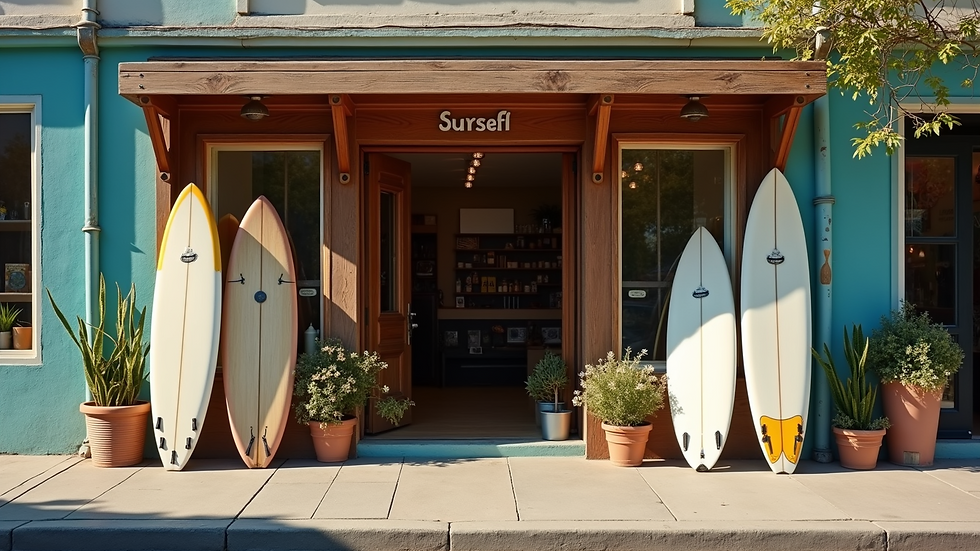Exploring Surf Culture and Its Impact on Communities
- Richard Suarez
- Oct 7, 2025
- 4 min read
Surf culture is more than just riding waves; it is a vibrant lifestyle that shapes communities around the world. From the beaches of California to the shores of Australia, surf culture influences local economies, social interactions, and environmental awareness. This blog post dives into the essence of surf culture, its historical roots, and the positive effects it has on communities.
Understanding Surf Culture and Its Origins
Surf culture began centuries ago with the Polynesians, who first rode waves on wooden boards. It gained global popularity in the early 20th century, especially in Hawaii and California. Today, surf culture is a blend of sport, art, music, and environmentalism.
At its core, surf culture promotes a deep connection with nature. Surfers respect the ocean and its power, often advocating for clean beaches and sustainable practices. This respect extends to the community, where surfers support local businesses and foster a welcoming atmosphere.
Surf culture also embraces creativity. From surfboard design to beachwear fashion, it inspires unique artistic expressions. Music genres like reggae and surf rock are closely tied to this lifestyle, creating a distinct cultural identity.

The Role of Surf Culture in Community Development
Surf culture plays a significant role in building and strengthening communities. It encourages social interaction and inclusivity, bringing together people from diverse backgrounds. Surf clubs and events create spaces where individuals can connect, share experiences, and learn from each other.
Economically, surf culture boosts local businesses. Surf shops, cafes, and accommodation providers benefit from the influx of surfers and tourists. For example, the point break shop supports local artisans and offers gear that reflects the community’s spirit.
Moreover, surf culture often promotes environmental stewardship. Many surf communities organize beach cleanups and advocate for ocean conservation. This collective effort helps preserve natural resources and raises awareness about environmental issues.
Communities influenced by surf culture tend to have a strong sense of identity and pride. This connection fosters resilience and cooperation, which are essential for addressing local challenges.

Where is Point Break located?
Point Break is a unique surf boutique that embodies the essence of surf culture. Located in a vibrant coastal area, it serves as a hub for surfers and locals alike. The shop offers a curated selection of surfboards, apparel, and accessories that reflect the laid-back yet adventurous spirit of the surf community.
The location of Point Break is strategic, situated near popular surf spots that attract both beginners and experienced surfers. This proximity allows the shop to stay connected with the needs and trends of the surfing world. It also acts as a gathering place where people can exchange stories, tips, and inspiration.
By supporting local artists and sustainable brands, Point Break contributes to the economic and cultural vitality of the area. It is more than a retail space; it is a community landmark that celebrates surf culture in all its forms.

How Surf Culture Influences Lifestyle and Well-being
Surf culture promotes a healthy and active lifestyle. Surfing itself is a full-body workout that improves strength, balance, and cardiovascular health. Beyond physical benefits, the connection with the ocean offers mental and emotional advantages.
Many surfers describe a sense of peace and mindfulness while riding waves. This connection to nature helps reduce stress and improve overall well-being. The social aspect of surf culture also combats isolation by fostering friendships and community support.
The lifestyle encourages simplicity and sustainability. Surfers often adopt eco-friendly habits, such as using reef-safe sunscreen and reducing plastic use. This mindset extends to daily life, influencing choices about food, transportation, and consumption.
Surf culture also inspires creativity and self-expression. From customizing boards to creating surf-inspired art and music, individuals find outlets for their passions. This creative energy contributes to personal growth and community vibrancy.
Practical Ways to Engage with Surf Culture
If you want to experience surf culture and its benefits, here are some practical steps:
Learn to Surf: Take lessons from local instructors to understand the basics and ocean safety.
Support Local Businesses: Visit surf shops like the point break shop to buy gear and apparel that support the community.
Participate in Events: Join surf competitions, beach cleanups, and cultural festivals to connect with others.
Adopt Sustainable Practices: Use eco-friendly products and respect the environment to preserve surf spots.
Explore Surf Art and Music: Attend exhibitions and concerts that celebrate surf culture.
Volunteer: Help with community projects that protect coastal areas and promote surf education.
By engaging in these activities, you contribute to the positive impact of surf culture on communities and enrich your own life.
The Future of Surf Culture and Community Impact
Surf culture continues to evolve, embracing new technologies and global influences. However, its core values of respect for nature, community, and creativity remain strong. As more people discover surfing, the culture’s impact on communities will likely grow.
Sustainable tourism and eco-conscious practices are becoming central to surf culture’s future. Communities are working to balance economic benefits with environmental protection. This approach ensures that surf spots remain pristine and accessible for generations.
Education and inclusivity are also priorities. Surf programs for youth and underserved populations help spread the culture’s positive values. These initiatives build stronger, more diverse communities connected by a shared love of the ocean.
In summary, surf culture is a powerful force that shapes communities socially, economically, and environmentally. By embracing its principles, individuals and communities can foster resilience, creativity, and sustainability.





Comments